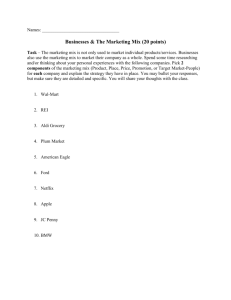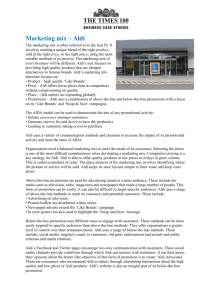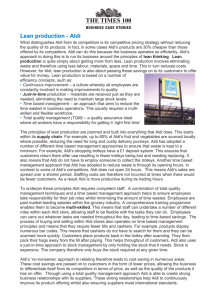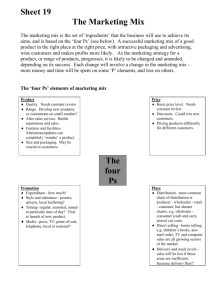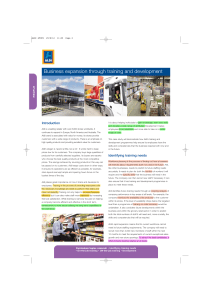Training and Development - Aldi
advertisement
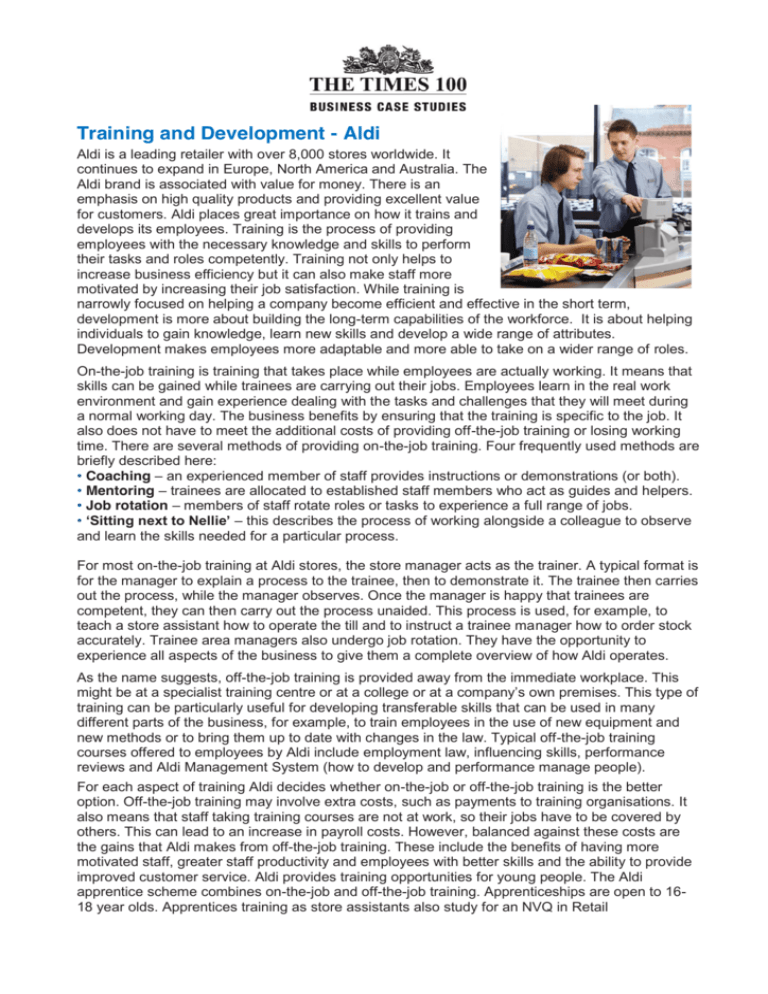
Training and Development - Aldi Aldi is a leading retailer with over 8,000 stores worldwide. It continues to expand in Europe, North America and Australia. The Aldi brand is associated with value for money. There is an emphasis on high quality products and providing excellent value for customers. Aldi places great importance on how it trains and develops its employees. Training is the process of providing employees with the necessary knowledge and skills to perform their tasks and roles competently. Training not only helps to increase business efficiency but it can also make staff more motivated by increasing their job satisfaction. While training is narrowly focused on helping a company become efficient and effective in the short term, development is more about building the long-term capabilities of the workforce. It is about helping individuals to gain knowledge, learn new skills and develop a wide range of attributes. Development makes employees more adaptable and more able to take on a wider range of roles. On-the-job training is training that takes place while employees are actually working. It means that skills can be gained while trainees are carrying out their jobs. Employees learn in the real work environment and gain experience dealing with the tasks and challenges that they will meet during a normal working day. The business benefits by ensuring that the training is specific to the job. It also does not have to meet the additional costs of providing off-the-job training or losing working time. There are several methods of providing on-the-job training. Four frequently used methods are briefly described here: • Coaching – an experienced member of staff provides instructions or demonstrations (or both). • Mentoring – trainees are allocated to established staff members who act as guides and helpers. • Job rotation – members of staff rotate roles or tasks to experience a full range of jobs. • ‘Sitting next to Nellie’ – this describes the process of working alongside a colleague to observe and learn the skills needed for a particular process. For most on-the-job training at Aldi stores, the store manager acts as the trainer. A typical format is for the manager to explain a process to the trainee, then to demonstrate it. The trainee then carries out the process, while the manager observes. Once the manager is happy that trainees are competent, they can then carry out the process unaided. This process is used, for example, to teach a store assistant how to operate the till and to instruct a trainee manager how to order stock accurately. Trainee area managers also undergo job rotation. They have the opportunity to experience all aspects of the business to give them a complete overview of how Aldi operates. As the name suggests, off-the-job training is provided away from the immediate workplace. This might be at a specialist training centre or at a college or at a company’s own premises. This type of training can be particularly useful for developing transferable skills that can be used in many different parts of the business, for example, to train employees in the use of new equipment and new methods or to bring them up to date with changes in the law. Typical off-the-job training courses offered to employees by Aldi include employment law, influencing skills, performance reviews and Aldi Management System (how to develop and performance manage people). For each aspect of training Aldi decides whether on-the-job or off-the-job training is the better option. Off-the-job training may involve extra costs, such as payments to training organisations. It also means that staff taking training courses are not at work, so their jobs have to be covered by others. This can lead to an increase in payroll costs. However, balanced against these costs are the gains that Aldi makes from off-the-job training. These include the benefits of having more motivated staff, greater staff productivity and employees with better skills and the ability to provide improved customer service. Aldi provides training opportunities for young people. The Aldi apprentice scheme combines on-the-job and off-the-job training. Apprenticeships are open to 1618 year olds. Apprentices training as store assistants also study for an NVQ in Retail Apprenticeship. They complete store assistant training and gain an NVQ Level 2 in their first year. They then take a store management training programme over two years and work for a Level 3 advanced qualification. Development is not the same as training. Development focuses as much on personal growth as skills that are directly related to the job. A development programme is designed to make individuals more skilled, more flexible in their approach and better qualified for their chosen careers. Through a development programme, employees can obtain transferable qualifications that benefit the individuals concerned as well as the business. This can have disadvantages for the business, as it gives workers greater value in the job market. However, Aldi is willing to take this risk as it believes in providing what is best for its staff. Opportunities for graduate recruits at Aldi include secondments to different international countries to develop all-round expertise. The Aldi retail placement scheme takes university students on a one-year placement. This allows the chosen individuals to show what they can offer the business and to find out what the business can offer them. Aldi offers an excellent reward package for students on a placement, but in return expects trainees to have enthusiasm, drive and ambition. Successful students get the opportunity to apply for a place on Aldi’s Area Management training programme. To support their development, managers help employees to set personal goals. These are identified during an appraisal process. This is when a member of staff sits down with their line manager to evaluate past and current performance, to consider what skills are needed going forward and to set targets for the future. Aldi puts great emphasis on developing its people. Over 85% of Aldi directors have been recruited from within the company. Questions 1. What is the difference between training and development? 2. Describe the two types of training used by Aldi. 3. Explain why organisations, like Aldi, may be wary of training and developing their employees. 4. Analyse the benefits to Aldi of having a well trained workforce Task Scenario – You have decided to open a book shop in your local town. You have carried out some research and think you need to hire two full time and one part time member of staff to work in the shop serving customers. Devise a training programme for these new staff (assuming they have had no previous experience). You will need to identify the knowledge, skills and qualifications required, and then determine what on and off-the-job methods can be used to ensure the workers gain these. What have you learned? 60 second challenge. Work with a partner and decide who is going to go first. This person then has to speak for 60 seconds, without pausing, about what they have learned about training and development. Then, the second person has to talk for 30 seconds about what they have learned, without repeating anything the first person has said.
